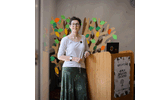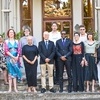Gene-editing breakthrough: UCT in landmark trial
13 June 2025 | Story Myolisi Gophe. Photos Lerato Maduna. Voice Cwenga Koyana. Read time 7 min.
In a ground-breaking first for South Africa and the African continent, local patients are participating in a pioneering international gene-editing clinical trial that may revolutionise treatment for hereditary angioedema (HAE), a rare and potentially fatal genetic disorder.
The clinical trial, now under way at the University of Cape Town’s (UCT) Lung Institute, uses CRISPR-Cas9 gene-editing technology, hailed globally as a revolutionary scientific advancement, to target the genetic root cause of HAE. The research is led by Professor Jonny Peter, principal investigator and head of UCT’s specialised Allergy and Immunology Unit: “This is a very exciting technology to be applied to humans,” said Professor Peter. “It’s amazing for us in South Africa, or anywhere in Africa, to be part of such a historic scientific milestone. It shows that we can contribute meaningfully to cutting-edge research and development.”
“It’s amazing for us in South Africa, or anywhere in Africa, to be part of such a historic scientific milestone.”
Particularly significant trial
CRISPR-Cas9 made international headlines in 2020 when Emmanuelle Charpentier and Jennifer Doudna were awarded the Nobel Prize in Chemistry for developing the genome editing technique. Though widely used in laboratory and animal studies, human applications are still in the early stages, making this trial particularly significant.
Sponsored by Intellia Therapeutics, a US-based biotechnology company, the trial represents the most advanced human clinical use of CRISPR-Cas9 to date.
HAE is a rare genetic condition characterised by recurring and severe swelling attacks in various parts of the body, including the airway, making it potentially life-threatening. These swellings are caused by excess levels of a molecule called bradykinin, which becomes overactive most commonly due to mutations in the SERPING1 gene, leading to a lack of inhibition of the kallikrein-kinin system and overproduction of bradykinin.
“Our South African cohort includes over 150 patients diagnosed with HAE. It’s not a common condition but can be devastating. Many families have experienced deaths due to airway swelling,” said Peter. “We’ve sadly seen fatalities across age groups from asphyxiation due to throat swelling. That’s why new therapies are so crucial.”
The experimental treatment aims to “knock out” the KLKB1 gene in the liver, thereby preventing the production of kallikrein, the key enzyme involved in generating bradykinin. By disabling the faulty gene, the therapy hopes to halt attacks at the molecular level – potentially offering patients a one-time, life-altering solution.
“The main concern with gene-editing therapy is the potential long-term consequences,” said Peter. “But what’s encouraging is that some people are naturally born without this gene and live perfectly healthy lives. This increases confidence that targeting it won’t cause long-term harm.”
Three-phase journey to hope
Prior to the current phase of the trial, the treatment underwent rigorous laboratory testing, animal studies and early-stage human trials. A pivotal Phase 2 study, led by Dr Hilary Longhurst and published in the prestigious New England Journal of Medicine, showed a 96% reduction in both frequency and severity of HAE attacks.

This study is now the pivotal Phase 3 trial and is a randomised, double-blind, placebo-controlled study, the gold standard in clinical research necessary for approval of a novel treatment. The goal is to test the treatment’s safety and effectiveness across a larger, more diverse group of patients.
“We’ve been approved to enrol five South African patients out of 62 globally. Today, we administered the second patient’s first dose,” Peter said during an interview on Tuesday, 10 June. “This puts us on par with top international trial sites.”
Patients will receive either the active treatment or a placebo infusion. After six months, the groups switch treatments in a crossover design, ensuring all participants receive the investigational therapy.
“The beauty of this design is that everyone in the trial gets the opportunity to benefit if the treatment proves to be effective,” explained Peter. “Meanwhile, we carefully monitor all participants for any side effects and of course the number of HAE acute swellings they experience.”
Why it matters for South Africa and Africa
For UCT and South Africa, involvement in this international trial is a milestone in equitable global health research.
“What this represents is that we can be part of absolutely cutting-edge science,” said Peter. “It shows that Africa doesn’t always have to come second. We’re part of these programmes from early in the development pipeline.”
He emphasised that these types of trials in rare diseases not only brings prestige but may open life-saving treatment options to local patients who might otherwise never access such high-cost innovations. Ethics committees ensure that companies studying novel medicines in South Africa commit to provide post-trial access to any medication that is proven effective for trial participants until the time of registration.
“Our involvement is a testament to the years of work we’ve invested in angioedema research.”
Our involvement in these types of cutting-edge studies is a testament to the years of work we’ve invested in angioedema research and building internationally competitive clinical trials infrastructure.”
Indeed, Peter’s unit has long been a hub for Angioedema research and treatment in Africa. The team has participated in several international clinical trials, some of which have already led to commercially available drugs. Their track record recently earned them a glowing audit from the United States Food and Drug Administration (FDA), confirming their status as a world-class clinical trial site.

“We’ve built a team of nearly 50 professionals, including doctors, nurses and research coordinators, who are committed to high-quality research,” said Peter. “That credibility is why companies like Intellia are willing to collaborate with us on these next-generation therapies.”
Peter is also leading a broader research initiative on angioedema across African countries, supported by a Global Professorship award from the United Kingdom’s National Institute for Health and Care Research (NIHR). The multi-country collaboration aims to expand awareness, improve diagnosis and study common forms of angioedema, especially those triggered by ACE inhibitors, a widely-used class of blood pressure medications.
Filling a critical gap
“There’s been so little background data on angioedema in Africa, and this research will fill a critical gap,” said Peter. “We want to ensure that the specific needs of African populations are studied, and that patients with uncommon but treatable forms of angioedemas are not missed across the continent.”
As the trial progresses, Peter and his team will continue to follow up with participants closely, documenting any attacks, responses to therapy and overall health outcomes.
“Safety is of the highest importance, and we closely monitor any participant on one of our clinical trials. We check in frequently, keep diaries, provide emergency treatments and ensure that everything is carefully recorded,” he said.
“This is one of the most exciting frontiers in medicine. To be part of a global effort that could change lives using gene-editing technology, right here in Cape Town, is both humbling and exhilarating.”
 This work is licensed under a Creative Commons Attribution-NoDerivatives 4.0 International License.
This work is licensed under a Creative Commons Attribution-NoDerivatives 4.0 International License.
Please view the republishing articles page for more information.
Faculty of Health Sciences News

Professor Anthony Figaji, head of Paediatric Neurosurgery at the University of Cape Town (UCT) and Red Cross Children’s Hospital, has been inaugurated as President of the International Society for Paediatric Neurosurgery (ISPN).
01 Dec 2025 Republished























